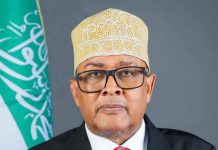Executive Summary
Somaliland Non- State Actors Forum (SONSAF) was closely monitoring the process of the voter registration since January 2016 through Domestic Voter Registration Observers and wider civil society engagement in the electoral process. This has paved the way Somaliland civil society to conduct sequences of policy actions which are promoting how free, fair and timely elections should be the overreaching goal of the country’s electoral process.
Therefore, the Somaliland National Electoral Commission (NEC) has successfully launched the second phase of the voter registration process presumably the voter cards distribution in the regions of Awdal, Sahil and Coastal areas of Sanaag region. On April 27th, 2017, NEC has held launching ceremonies in the above regions which the Political Parties’ Leaders, EU Ambassador Somaliland/Somalia, DANIDA Program Coordinator in Somaliland, international elections partners, Civil Society Groups, Traditional Elders, Religious Leaders, Regional Governors, Mayors, Universities Students and general public attended.
On 28th of March 2017, NEC has announced that 8, 73,331 valid registrants were registered to vote in the upcoming Presidential elections on November, 13th, 2017. This number was identified through careful vetting of the whole registrants based on the Voter Registration Law No. 37/2007.Thus, this stated number of the voters, the voter registration law recognizes as provisional voter list and the final voter’s list will be produced when voter cards distribution concluded and should be ordered the ballot papers.
Moreover, the Domestic Observers combined with Somaliland Civil Society Election Forum (SCISEF) reported that the voter cards delivery exercise was very peaceful, though bothered a couple of factors included the massive rural communities’ displacement during the drought period which sized across the region of Somaliland, lower voter education which hampered the process of the voter cards display period and the impact of the successive elections postponements.
Introduction
The second phase of the voter cards distribution has had a high significant political outlook to pursue the finalization of the provisional voter list declared by the NEC on March 28th, 2017 which figured out the total of the valid 8, 73,331 and invalid 34080 registrants and this has initially affected by frequent elections postponements as well as the separation of the elections where the House of Representative elections was further postponed to be held on April 2019.
The drought effect was also obvious especially in the rural communities because the ecological problems linked with climate change caused massive rural –urban migration and lost hundred thousands of livestock. In fact, every region was demanding from NEC to extend the timeframe of the cards distribution since drought circumstances made the situation difficult.
The classification of the voters’ names into alphabetical order followed by the low and insufficient voter education hugely pressured citizens to collect their voter cards and this has triggered some criticisms on NEC which many Government Officials as Regional Administrations and Ministers presented through media channels but NEC representatives reacted these allegations and clarified some of the concerns raised from this voter cards dissemination.
The domestic observers in the Regions of Awdal and Sahil have reported the existence of some confusion on the Voter card distribution centers inside the cities of Borama and Berbera during the first seven days of the Voter card distribution period.
During the voter registration period, up to three polling centers have been squeezed into one registration center inside Regional capitals but the distribution phase NEC divided one registration center into either two or three center justifying that otherwise the election day the voters cannot cast their vote due to the high turnout registered earlier.
Hence, many people were hurrying to reach in the queues to their previous registration centers that later on divided into different centers following names in the alphabetical order. In this case, it was seen that many people who were coming registration centers did not succeed to collect their cards upon their arrivals because of the re-arrangement of the voter registration centers.
As result, the establishment of new centers of the voter cards distribution and categorization of the names through alphabetical orders has made a lot of interruptions in the queues. Eventually, the Domestic Observers pointed out that this second phase of the voter cards distribution the community mobilization was not effective.
The potential candidates for the House of Reprehensive elections that previously took part community mobilization in the most districts have now entirely disappeared this time and this may affect the turnout of the voters across the regions.
On the other hand, the frequent Elections postponements combined with severe recurrent droughts 2016-2017 lowered the public expectations on timely elections but this time the people of Somaliland are very much committed to casting their votes for the upcoming presidential elections on November, 13th 2017.
Key Summary of Findings
- Domestic Observers reported that the process of the voter cards distribution was entirely peaceful and no insecurity activities have been reported.
- Domestic Observers pointed out that voter education outreach was too low and the message was not sufficiently delivered across.
- Domestic Observers reported that there were several vehicles intended to deliver voter education messages moving around the main cities with laudable speakers but this needs different methodologies to be employed with a coherent strategy and regular monitoring.
- Domestic Observers stated that this second round of the voter registration process the communities in these regions were not well organized compared to the first phase of the voter registration exercise, therefore, this low turnout is imminent mainly in the rural areas.
- The postponement of the House of Representatives elections particularly diminished the local community internal mobilizations and sensation of the grass roots in the voter registration period.
- Domestic Observers indicated in the first phase of the voter registration the potential candidates of the House of Representatives elections have been continually mobilizing communities both Urban and Rural.
- Domestic Observers reported that Officials from the Government including the Minister of Education, State Minister of Foreign Affairs, Governor of Awdal, Mayor of Borama District, local Councilors and some MPs elected from the Awdal Region raised concerns about the voter cards distribution plan and criticized National Electoral Commission.
- There were many people who confused the re-arrangement of the voter registration centers and categorization of the names as alphabetical order and this poor voter education process may undermine the spirit of the citizens to cast their vote for the upcoming presidential elections.
- Domestic Observers were also witnessing the rejection of the double registered persons that arrived at different voter cards distribution centers.
Policy Recommendations to NEC
- Enhance and modify the methodology of voter education and awareness raising activities in order to mitigate the challenges encountered during Awdal, Sahil and Coastal areas of Sanaag. The shortcomings of the voter education are repeated across the process of the voter registration as domestic observers reported.
- The voter education partners and implementers are needed to commence awareness raising activities ahead of the voter cards distribution by employing applicable and a variety of methodologies that suitable both Urban and Rural communities, this may reduce the livelihood of the public disorder during the voter cards distribution for the following remaining regions.
- The voter and civic education interventions are required a national strategy in order to consolidate the various efforts towards in this area of the voter and civic education and lessons learned Awdal and Sahil regions would be an asset to all election stakeholders particularly voter education implementers.
Policy Recommendations to Government Officials
- Government officials must be more careful taking any steps and accusations to this process of voter cards distribution and elections while the government is responsible the overall exercise of the voter registration and elections.
- Government officials at regional, district and national level are needed to cooperate with National Electoral Commission (NEC) for the matters related to voter cards distribution, any concerns arise from this process of the cards distribution must be resolved through dialogue and mutual accountability.
- The first phase of the voter registration process was successful and mostly depoliticized, therefore, CSOs recommended continuation such mutual cooperation between key elections stakeholders as Government, Political Parties, NEC, International Partners and Civil Society on the second of the phase of the voter cards distribution.
- The CSOs of Somaliland are calling for the overnment of Somaliland to release unconditionally the WADDANI youth wing members arrested and the CSOs are denouncing any politically motivated detention contrary to the national constitution and this may restrain Somaliland to accomplish free, fair, transparent and competitive elections.
Policy Recommendations to Civil Society
- Need synergy, and acceleration of voter and civic education activities and moderating dialogue between elections key stakeholders.
- Maximize efforts towards promoting civic participation, awareness raising and information dissemination on voter and civic education. CSOs must also defend the press freedom and human rights.
Conclusion
The voter cards distribution process in the first regions of Adwal, Sahil and Coastal areas of Sanaag region have been successfully concluded on May 21, 2017. SONSAF is encouraging NEC and its partners of the voter and civic education to redouble their efforts on voter and civic education interventions on the basis of contextual and social realities. Delivering the voter and civic education messages must be clear, comprehensive and predictable on the level of impact on audiences and specific target groups in the country.
Finally, at moment the political and electoral atmosphere vindicate consolidated momentum pushing forward the presidential elections must be held on November 2017. The EU Ambassador Somaliland/Somalia speech in the opening ceremony in Borama on 27, April, 2017 clearly indicates the unwavering support of the international community to Somaliland electoral process and it is noteworthy to maintain such momentum of mutual cooperation and solidarity.
bandhige@gmail.com
































